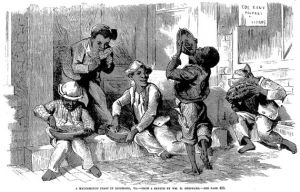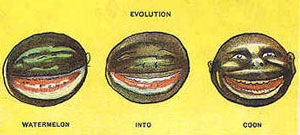The Watermelon
How does a watermelon relate to the black race? Why are black people mocked as they eat watermelons while white people are free to eat watermelons? The stereotype might be ambiguous for several people, but for black Americans, this has emerged for a particular political purpose during the Civil War era. Watermelons became a symbol of freedom as the black people, primarily slaves in the Civil War are free to cultivate, eat and sell them in markets. Southern whites are intimidated with watermelons as the symbol of freedom, and they decided to campaign that watermelons are a symbol of dirtiness, stupidity, negligence, and unworthy. The campaign has gone massive, becoming racist tropes in American culture, which still exist today.
The racist trope is showing in the news, such as in the protest of Michael Brown's killing where a watermelon display portrays a mockery against the Black Empowerment march[1]. Not only that, while Obama went up becoming the President of the US, a cartoonist of the Boston Herald depicts a satire cartoon where an intruder is lying in President Obama's bathtub, questioning him if he has tried the "watermelon-flavored toothpaste.". Though the Boston Herald quickly apologized for the cartoon, the racist trope on watermelon still exists up to the modern era in the 2000s[2].
History
At first, southern whites believe that letting slaves enjoy watermelons showed benevolence given by the slave owners. Slaves were given instructions on how to enjoy watermelons. However, the act of generosity is changed into a mocker as emancipation emerged. When the black people found watermelons as a symbol of freedom to consume and make money from cultivating watermelons, the Southern whites published a caricature in Frank Leslie’s Illustrated Newspaper in 1869. The caricature showed the blacks were eating watermelons, and the caption said, “The Southern negro in no particular more palpably exhibits his epicurean tastes than in his excessive fondness for watermelons. The juvenile freedman is especially intense in his partiality for that refreshing fruit.”[3] Furthermore, there was a scene where a white boy named Henry Evans was angry for being left by his black nanny. When he encountered her on the street, her nanny offered him a watermelon but, he declined the offer and even said that he would not eat watermelons as it was negroes food.[4]

In the 1880 election period, the Democrats accused the South Carolina state legislatures (mostly are blacks) that they had wasted taxpayers' money on the refreshment of watermelons. Although it was a lie, American history books recorded the story. At the beginning of the 20th century, the racist trope on watermelons spread everywhere. There was a phenomenal postcard that displayed a watermelon carried by an elderly black man. The black man is shown to be bewailed and said, "Dis am de wust perdickermunt ob mah life." which referred to black men only care about their stomach. Another postcard named "Coon cards" showed where Black people steal watermelons, argue over watermelons, and eventually transform into watermelons. The Jim Crow Museum stores many three-dimensional objects such as toys, match handles, figures, relics, and crackers are displaying black Americans eating watermelons. Some of them are portrayed as contented Coons with hideous faces, and bright red highlighted lips, and torn clothes.

When Jackie Robinson went into Major League Baseball as the first black professional player in 1947, he was thrown garbage, tomatoes, and watermelon slices. Besides, while the black protested the slaughter of a black boy in Bensonhurst, New York, in 1989, some white people yelled at them and held watermelons above their heads as a mockery for the black people.[7] There have been hundreds of racist trope cases related to watermelons and have existed for more than a hundred years.
Black Tropes
Initially, the watermelons are a mockery for poor Arabs. In 1801, the British officer in Egypt said watermelons as food for poor Arabs. It happened because the Arabs were eating swiftly and ravenously like somebody tried to take the food from them, and later on, they would throw the rinds to the street. For the British, this has become an implication of dirtiness, sloth, stupidity, and noise. Dirtiness since the peels are thrown to the road, sloth as people did nothing while eating watermelons, stupidity as it's assumed to lack nutrition, and noise as people who eat watermelons tend to attract other people's attention. However, the slave owners adopted this trope on the Blacks and magnified the trope through media. The trope has become a political tool for degrading the Blacks. Racists have always maintained mockery up to this era. It might sound stupid to mock people with fruits. Yet, it does exist as people's subconscious can be shaped through repeated taunts to vilify the blacks.[8]
References
- ↑ Gardner, John.Ferguson 'march for justice' met with display of a melon, fried chicken, a 40oz beer and 200 racist protesters in rural Missouri. December 05, 2013. dailymail.co.uk. Retrieved March 21, 2021.
- ↑ Killough, Ashley.Boston Herald apologizes for Obama cartoon after backlash. October 01, 2014. edition.cnn.com. Retrieved March 21, 2021.
- ↑ Black, William R. How Watermelons Became a Racist Trope. December 08, 2014. theatlantic.com. Retrieved March 21, 2021.
- ↑ Black, William R. How Watermelons Became Black. March 2018. University of North Carolina Press. Retrieved March 21, 2021.
- ↑ Black, William R. Frank Leslies. December 04, 2014. theatlantic.com. Retrieved March 21, 2021.
- ↑ Pilgrim, David. Evolve. May 2018. Ferris State University. Retrieved March 21, 2021.
- ↑ Pilgrim, David. Blacks and Watermelons - May 2000. May 2018. Ferris State University. Retrieved March 21, 2021.
- ↑ Black, William R. How Watermelons Became Racist Trope. December 2014. Montclair State University. Retrieved March 21, 2021.